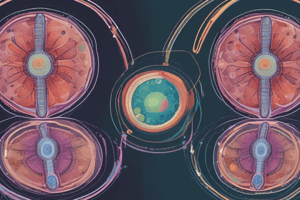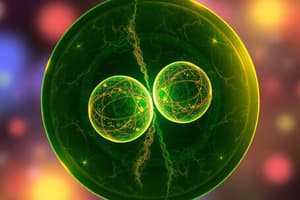Podcast
Questions and Answers
What is the primary difference in ploidy between the nuclei in mitosis and meiosis?
What is the primary difference in ploidy between the nuclei in mitosis and meiosis?
- Mitosis results in haploid nuclei, while meiosis results in diploid nuclei
- Both are diploid in mitosis and haploid in meiosis (correct)
- Both processes result in diploid nuclei
- Both are haploid in mitosis and diploid in meiosis
During interphase, the cell undergoes DNA condensation.
During interphase, the cell undergoes DNA condensation.
False (B)
Name the four stages of the mitotic phase.
Name the four stages of the mitotic phase.
Prophase, Metaphase, Anaphase, Telophase
The three stages of interphase are G1, S, and _____ phase.
The three stages of interphase are G1, S, and _____ phase.
Match the following phases of the cell cycle with their descriptions:
Match the following phases of the cell cycle with their descriptions:
What is the primary function of mitosis?
What is the primary function of mitosis?
Meiosis is essential for growth and repair in organisms.
Meiosis is essential for growth and repair in organisms.
What are the two main types of cell division?
What are the two main types of cell division?
The process by which offspring are produced from a single fertilized egg is called __________.
The process by which offspring are produced from a single fertilized egg is called __________.
Match the following terms with their correct descriptions:
Match the following terms with their correct descriptions:
Flashcards are hidden until you start studying
Study Notes
Cell Division Overview
- Cell division is essential for organism growth, reproduction, and tissue repair.
- Two main types: mitosis (growth and repair) and meiosis (sexual reproduction).
The Cell Cycle
- The cell cycle consists of interphase and the mitotic phase.
- Interphase prepares the cell for division; subdivided into G1, S, and G2 phases:
- G1 (Gap 1): Cell growth and metabolic activity.
- S (Synthesis): DNA replication and organelle duplication.
- G2 (Gap 2): Synthesis of proteins for mitosis.
Mitosis
- Mitosis produces genetically identical daughter cells.
- Phases of mitosis: Prophase, Metaphase, Anaphase, Telophase, followed by Cytokinesis (PMAT).
- Each daughter cell remains diploid (2n).
Meiosis
- Meiosis results in four unique haploid daughter cells (n).
- Two main stages: Meiosis I and Meiosis II.
Meiosis I
- Chromosomes are replicated during the S phase, forming sister chromatids.
- Reduction of chromosome number from diploid to haploid occurs in this phase.
Meiosis II
- Sister chromatids separate, similar to mitosis.
- Produces four genetically unique haploid gametes due to random assortment and crossing over.
Ploidy Levels
- Haploid (n): One set of chromosomes, found in gametes.
- Diploid (2n): Two sets of chromosomes, found in somatic cells.
- Humans have 23 pairs of chromosomes (22 pairs of autosomes and 1 pair of sex chromosomes).
Homologous Chromosomes
- Chromosomes exist in pairs called homologues, except for sex chromosomes (X and Y).
- Human somatic cells: 46 chromosomes (two copies of each).
Significance of Cell Division
- Vital for the continuity of life, cellular repair, and genetic diversity in sexual reproduction.
- Proper function of the cell cycle is crucial for preventing disorders and diseases associated with abnormal cell division.
Laboratory Activity
- Focus on the study of cellular growth in crops and livestock.
- Investigate cellular functions in onions' root tips to address agricultural issues.
- Understanding mutations through the analysis of cell division in animals.
Studying That Suits You
Use AI to generate personalized quizzes and flashcards to suit your learning preferences.





